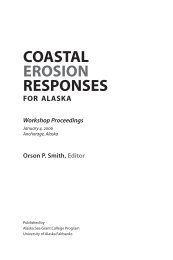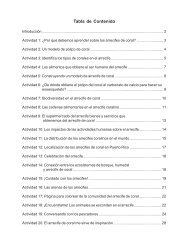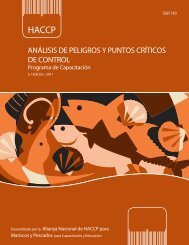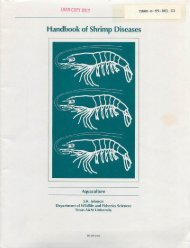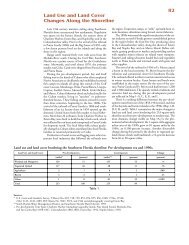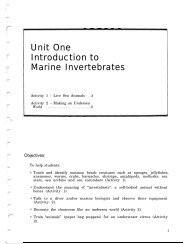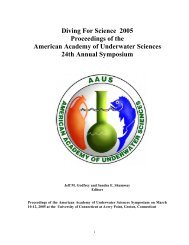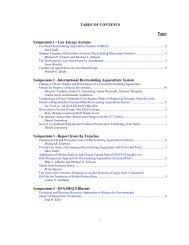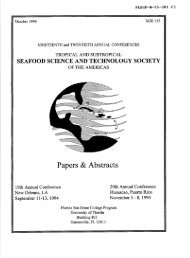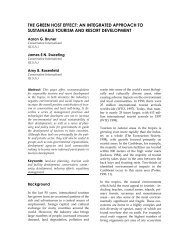Full document / COSOC-W-86-002 - the National Sea Grant Library
Full document / COSOC-W-86-002 - the National Sea Grant Library
Full document / COSOC-W-86-002 - the National Sea Grant Library
- TAGS
- nsgl.gso.uri.edu
You also want an ePaper? Increase the reach of your titles
YUMPU automatically turns print PDFs into web optimized ePapers that Google loves.
696<br />
Irrevocably, <strong>the</strong>y say. Once ve begin to dispose of radvastes thus, <strong>the</strong><br />
process may not be easily reversible.<br />
Advocates of remote disposal, on <strong>the</strong> o<strong>the</strong>r hand, want to sao final<br />
and perhaps Irrevocable disposal in <strong>the</strong> remotest possible place. Get<br />
It away from people and o<strong>the</strong>r life forms, <strong>the</strong>y say. Although ve may<br />
not know enough about <strong>the</strong> marine environment to say vith absolute<br />
confidence that radvaste placed in tha deep-seabed will not reach <strong>the</strong><br />
biosphere, still we know enough about it to conclude that it's tha best<br />
ve can do, <strong>the</strong> fur<strong>the</strong>st we can economically get from human activity.<br />
As one advocate puts It, "We know mora about <strong>the</strong> plumbing of <strong>the</strong> oceans<br />
than ve do about Che plumbing of <strong>the</strong> land." (Edward Goldberg, "The<br />
Oceans as Waste Space: The Argument," Oceanus. Spring 1981 at 9.)<br />
Important assumptions and costs arc burled within each of <strong>the</strong>se<br />
views. Daop-sca disposal encourages an "out-of-sight, out-of-mlnd"<br />
mode of thinking, and it roduces incentives to restraint and recycling<br />
by using what economists call a natural subsidy to Internalize <strong>the</strong><br />
costs of disposal. On <strong>the</strong> o<strong>the</strong>r hand, land-baaed monitored vaste<br />
disposal also has hidden assumptions. It may overestimate <strong>the</strong><br />
stability of governments and civilizations and <strong>the</strong>ir ability to sustain<br />
<strong>the</strong> kind of long-term commitment needed for effective monitoring. It<br />
externalizes on future generations costs that <strong>the</strong>y may be unwilling to<br />
bear.<br />
Advocates of each view need to answer tho following questions<br />
before ethical and policy analysis of deep-sea dumping can proceed. To<br />
<strong>the</strong> advocates of deep-sea disposal: Are you confident enough in your<br />
belief that <strong>the</strong> deep-seabed is <strong>the</strong> bast place to dispose of radvastes<br />
that you would put it where you can't ratrleve it if you're wrong? And<br />
to <strong>the</strong> advocates of monitored land disposal: Do you really believe that<br />
any government in <strong>the</strong> world, now or in <strong>the</strong> future, after investing<br />
billions in storage facilities, vould willingly abandon that Investment<br />
if something went wrong, and spend an even greater amount to repair <strong>the</strong><br />
damage?<br />
Ethical Analysis of Ocean Dumping<br />
Environmental ethics Is that branch of philosophy which seeks to<br />
discover <strong>the</strong> scope of human duties toward <strong>the</strong> natural environment. It<br />
Is a relatively new branch of Inquiry, probably Invented as a formal<br />
discipline in 1949 vith <strong>the</strong> publication of Aldo Leopold's A Sand County<br />
Almanac. It takes as its starting point <strong>the</strong> following classic<br />
statement from Leopold's book: "A thing is right when it tends Co<br />
preserve tha integrity, stability, and beauty of <strong>the</strong> biotic community.<br />
It is wrong when it tends o<strong>the</strong>rwise." (Galaxy Book edn., 1970, at<br />
224-25.) The field now has its own academic journal, in which are<br />
published contributions by philosophers, social scientists, lawyers and<br />
resource managers. (Environmental Ethics, Dept. of Philosophy,<br />
University of Georgia, A<strong>the</strong>ns, GA 30602.)<br />
Anthropocentrlsn vs. blocentrism<br />
Among environmentalists <strong>the</strong>re is a wide variety of ethical<br />
stances. We are all familiar with <strong>the</strong> division betveen<br />
conservationists vho advocate "wise use" of resources and<br />
preservationists vho would put much of what remains off limits to<br />
development. Much debato is also going on about whe<strong>the</strong>r environmental<br />
values should be "anthropocentrlc," i.e., human-centered, or<br />
"blocentrlc," life-centered. The blocentrlc approach to environmental




